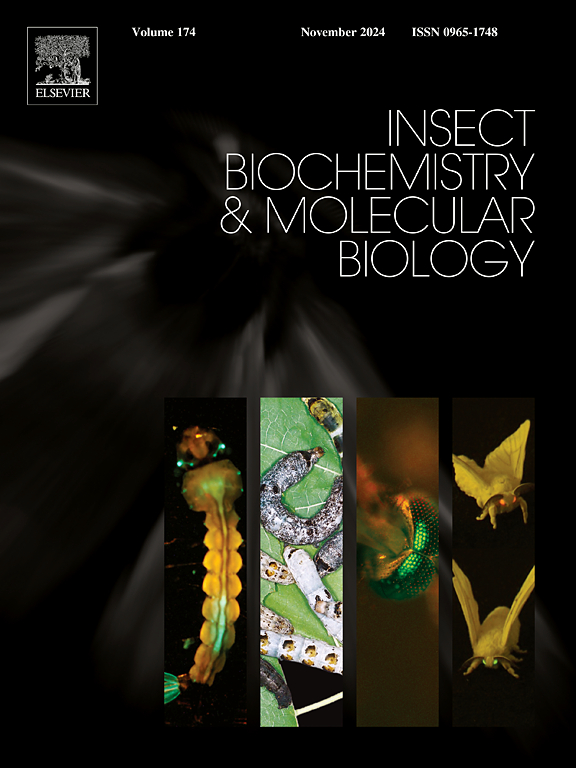The synthesis of nitric oxide regulated by JNK pathway in the pea aphid to defend against bacterial infection
IF 3.7
2区 农林科学
Q2 BIOCHEMISTRY & MOLECULAR BIOLOGY
引用次数: 0
Abstract
Compared to other insects, the pea aphid Acyrthosiphon pisum exhibits limited immune responses, particularly due to the absence of many immune genes, including those encoding antimicrobial peptides and key components of the IMD pathway. Prior studies proved that the conserved signaling, Jun N-terminal kinase (JNK) pathway, plays a critical role in the immune system of the pea aphid, and nitric oxide synthase (NOS) is required for the pea aphid's defense against infections. Herein, using in vitro biochemical assays and in vivo bioassays, we demonstrated that the JNK pathway directly regulates the expression of NOS and that the JNK pathway-NOS-NO signal axis is efficient in defending against bacterial infections. The Toll pathway is instrumental for combating bacterial infections, and NO can activate the Toll pathway. The Toll pathway induced by NO regulates the expressions of ROS metabolism, lysosome, and phagocytosis-related genes. NO was identified as a crucial signaling molecule that facilitates communication between the JNK and Toll pathways.

JNK途径调控豌豆蚜虫一氧化氮合成抵抗细菌感染的研究
与其他昆虫相比,豌豆蚜虫表现出有限的免疫反应,特别是由于缺乏许多免疫基因,包括那些编码抗菌肽和IMD途径关键成分的基因。先前的研究证明,保守的信号通路Jun N-terminal kinase (JNK)通路在豌豆蚜虫的免疫系统中起着至关重要的作用,而一氧化氮合酶(NOS)是豌豆蚜虫防御感染所必需的。通过体外生化实验和体内生物实验,我们证明了JNK通路直接调控NOS的表达,JNK通路-NOS- no信号轴在抵抗细菌感染方面是有效的。Toll通路是对抗细菌感染的工具,而NO可以激活Toll通路。NO诱导的Toll通路调节ROS代谢、溶酶体和吞噬相关基因的表达。NO被认为是促进JNK和Toll通路之间通信的关键信号分子。
本文章由计算机程序翻译,如有差异,请以英文原文为准。
求助全文
约1分钟内获得全文
求助全文
来源期刊
CiteScore
7.40
自引率
5.30%
发文量
105
审稿时长
40 days
期刊介绍:
This international journal publishes original contributions and mini-reviews in the fields of insect biochemistry and insect molecular biology. Main areas of interest are neurochemistry, hormone and pheromone biochemistry, enzymes and metabolism, hormone action and gene regulation, gene characterization and structure, pharmacology, immunology and cell and tissue culture. Papers on the biochemistry and molecular biology of other groups of arthropods are published if of general interest to the readership. Technique papers will be considered for publication if they significantly advance the field of insect biochemistry and molecular biology in the opinion of the Editors and Editorial Board.

 求助内容:
求助内容: 应助结果提醒方式:
应助结果提醒方式:


